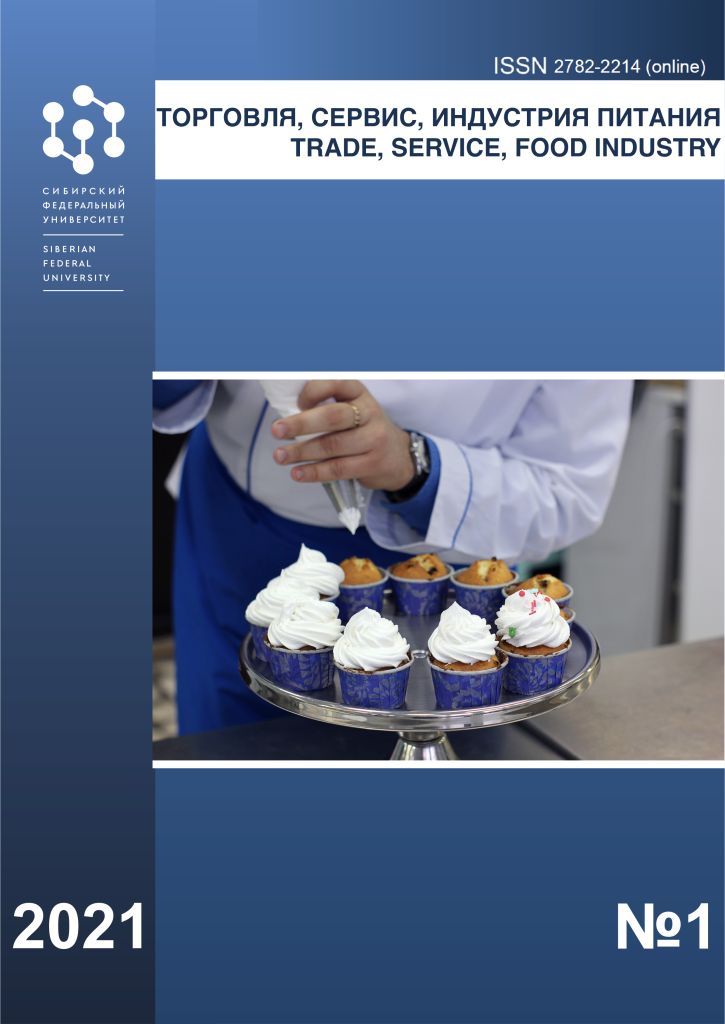Krasnoyarsk, Russian Federation
Frankfurt-na-Mayne, Germany
Krasnoyarsk, Krasnoyarsk, Russian Federation
UDC 33
CSCSTI 06.58
Russian Classification of Professions by Education 38.06.01
Russian Library and Bibliographic Classification 65
Russian Trade and Bibliographic Classification 7711
BISAC BUS069030 Economics / Theory
The information base of the study was the works of economists in the field of the theory of consumer demand. The article is devoted to the influence of consumer demand on the dynamics of the national economy. The hypothesis of the study is the assumption of increasing influence of Keynesian-institutional factors on the development of the Russian economy. In this study, the authors apply a Keynesian approach to the analysis of the Russian economy, based on the premise that consumer demand, which is the most significant component, is a key factor in macroeconomic dynamics. The discussion on the impact of consumer demand on the dynamics of the national economy continues. The article examines the evolution of scientific approaches related to the theory of consumption and consumer demand of households, their formation at the microeconomic level and the transition to the macroeconomic level. The analysis of the dynamics of consumer demand of households, the relationship of the dynamics of income and expenditure of the population with the composite index of consumer confidence is presented. Consumers expectations regarding the pandemic had a negative impact on consumer confidence and consumer demand in 2020 dynamics of consumer demand in the Russian economy in modern conditions shows an unstable trend. There is a drop in consumer demand, a decline in the level of savings and a drop in the index of consumer confidence of households. The results of the study can be used as guidelines for the state's economic policy aimed at stabilizing the national economy. The directions of future research are related to the study of the role of Keynesian-institutional factors in the development of the national economy, their impact on microeconomic and macroeconomic dynamics.
consumer expectations, consumption theory, consumer demand, aggregate demand structure, microeconomics, macroeconomics, macroeconomic dynamics, composite consumer confidence index, Keynesian-institutional factors, stabilization of the national economy
1. Alexandrov, Yu. L. Suslova, Yu. Yu., Demchenko, S. K., Melnikova, T. A., Demchenko, O. S. (2015). Problems of efficiency and sustainability of the development of the macroeconomic system. Siberian Federal University, Trade and economic Institute. Krasnoyarsk. 164 p.
2. Allen, R. (2013). Global economic history: a brief introduction. Moscow. Publishing house of the Gaidar Institute. 224 p.
3. Blaug, M. (2008). Francis Isidore. In: 100 great economists before Keynes. St. Petersburg. Ekonomikus. P. 336-339.
4. Demchenko, S. K. (2008). Structural changes in the economy and macroeconomic dynamics. Problems of the modern economy. No 2 (26). Pp. 61-65.
5. Keynes, J. (2017). General theory of employment, interest and money. Moscow. Helios ARV. 352 p.
6. Leibenstein, H. (1999). The effect of joining the majority, the snob effect and the Veblen effect in the theory of consumer demand. In: Milestones of economic thought. The theory of consumer behavior and demand. Vol. 1. Ed. by V. M. Galperin. St. Petersburg. Economic school. Pp. 304-325.
7. Neumann, J. (1970). Game theory and economic behavior. Moscow. Science. 707 p.
8. Rosstat. URL: https://rosstat.gov.ru/statistic
9. Suslova, Yu. Yu., Demchenko O. S. (2017). Structural and institutional factors of modern crises in developed countries. Microeconomics. No. 1. Pp. 5-9.
10. Hicks, J. R. (2004). Foundations of the welfare economy. In: Milestones of economic thought. Vol. 4. Economics of welfare and public choice. Ed. by A. P. Zaostrovtsev. St. Petersburg. Economic school. Pp. 17-38.
11. Schumpeter, J. (2011). Vilfredo Pareto (1848-1923). In: Ten great economists from Marx to Keynes. Moscow. Gaidar Institute. Pp. 162-205.
12. Brazelton, W.R., Whalen, C.J. (2011). Towards a Synthesis of Institutional and Post-Keynesian Economics. In: Financial Instability and Economic Security after the Great Recession. Cheltenham. Edward Elgar.
13. Loasby, B. J. (1976). Beyond Economic Man. A New Foundation for Microeconomics. By H. Leibenstein. The Economic Journal. Vol. 86 (344). Pp. 913-915. URL: https://www.sciencedirect.com/science/article/abs/pii/0090572076900164.
14. Demchenko, S.K., Suslova, Yu.Yu. [et. al.] (2016). Aggregate Demand and its Pattern in the Contemporary Russian Economy. Journal of Internet Banking and Commerce. T.21. № S3. URL: http://www.icommercecentral.com/open-access/aggregate-demand-and-its-pattern-in-the-contemporary-russian-economy.php?aid=71900.
15. Demchenko, S.K., Zlotnikov, M.S., Melnikova, T.A., Demchenko, O.S. (2019). Theoretical and methodological bases of improving the assessment of the effectiveness and synchronous functioning of a country's socioeconomic system under conditions of transformation. International Journal of Civil Engineering and Technology. 10 (2). Pp. 1877-1884. URL: http://www.iaeme.com/ijciet/IJCIET_Paper.asp?sno=16004.
16. Krugman, P. International Economics Theory and Policy. URL: http://repository.fue.edu.eg/xmlui/bitstream/handle/123456789/2890/10314.pdf?sequence=1&isAllowed=y
17. Leibenstein, H. Individual Behavior and Economic Outcome (Book Reviews: Beyond Economic Man. A New Foundation for Microeconomics). URL: https://www.semanticscholar.org/paper/Individual-Behavior-and-Economic-Outcome.-(Book-A-Leibenstein/e0cb26a5dc09e488d3113f29e73a66e0689b1ae6.
18. Mahon, J., Davies, Ph. The Meaning of Slutsky. URL: https://www.minneapolisfed.org/article/2009/the-meaning-of-slutsky.
19. Peterson, W.C. (1977). Institutionalism, Keynes and the Real World. Journal of Economic Issues. No. 11(2). Pp. 201-221.
20. Whalen, C.J. (2020). Post-Keynesian Institutionalism After the Great Recession. Levy Economics Institute on Bard Colledge. Working Paper No. 724 URL: http://www.levyinstitute.org/pubs/wp_724.pdf.Zhironkin, S., Janocko, J., Demchenko, S., Suslova, Y., Zhironkina, O.Reproduction Forms of Sustainable Development Policy in Russia // E3S Web of Conferences, 174, 04020. URL: https://www.e3s-conferences.org/articles/e3sconf/pdf/2020/34/e3sconf_iims2020_04020.pdf
21. Zhironkin, S., Janocko, J., Demchenko, S., Suslova, Yu., Zhironkina, O. (2020). Reproduction Forms of Sustainable Development Policy in Russia. In: E3S Web of Conferences, 174, 04020. URL: https://www.e3s-conferences.org/articles/e3sconf/pdf/2020/34/e3sconf_iims2020_ 04020.pdf








